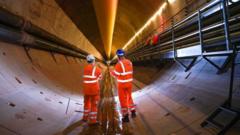Will HS2 Line Opening Be Pushed Past 2033?

Understanding the Delays and Challenges of the HS2 Project
The High Speed 2 (HS2) railway project has been a centerpiece of the United Kingdom's infrastructure plans since its inception. Envisioned to create rapid rail connections between London and major cities in the Midlands and North of England, HS2 aimed to cut journey times and significantly expand railway capacity. However, as recent developments indicate, this ambitious project is facing significant delays and cost overruns that have sparked widespread concern and frustration. In this article, we will delve into the complexities surrounding HS2, examining its history, the reasons behind the delays, and the implications for the future of rail travel in the UK.
The Vision Behind HS2
When HS2 was first announced in 2010, it was hailed as a transformative project for the UK. The original estimates pegged the cost at £33 billion, with an expected completion date in 2026. The goal was to create a high-speed rail line that would link London with key cities like Birmingham, Manchester, and Leeds, thereby revolutionizing travel and boosting economic growth in the regions.
At its core, HS2 was designed to:
- Reduce journey times between major cities.
- Increase rail capacity to accommodate a growing number of passengers.
- Encourage economic development in the Midlands and North of England.
- Promote environmental benefits by encouraging a shift from car and air travel to rail.
The Path to Delays
Despite its promising vision, HS2 has faced a barrage of challenges that have led to increasing costs and delays. The latest reports suggest that the opening of HS2 will now extend beyond the previously targeted date of 2033. Here are some of the critical factors contributing to these setbacks:
1. Rising Costs
One of the most alarming aspects of HS2 has been the spiraling costs associated with the project. Since 2012, the cost of HS2 has risen by a staggering £37 billion. Initial projections of £33 billion have ballooned to estimates ranging from £45 billion to £57 billion in 2019 prices. Such discrepancies raise serious questions about project management and oversight.
2. Independent Reviews and Investigations
In response to the ongoing issues, the UK government has commissioned independent reviews to assess the situation. The findings from a review led by James Stewart, former chief executive of Crossrail, are expected to shed light on the myriad failures contributing to HS2's troubles. From inadequate planning to mismanagement, the report is anticipated to identify areas where oversight has faltered.
3. Political Landscape
The political environment surrounding HS2 has also played a significant role in its challenges. The project has seen changes in government and leadership, with differing priorities and policies affecting its trajectory. The Conservative governments have faced criticism for allowing costs to escalate without adequate controls in place.
4. Project Scaling Back
As financial realities set in, the government has been forced to scale back the original plans for HS2. The Birmingham to Manchester leg was canceled in 2023, and the ambitious eastern leg connecting Birmingham to Leeds was also scrapped. These decisions reflect the government's attempt to mitigate costs, but they also undermine the original vision of a comprehensive rail network.
The Implications of HS2 Delays
The ongoing delays and increasing costs associated with HS2 raise several critical questions about the future of rail travel in the UK. The implications extend beyond just the project itself; they affect regional economies, transport capacity, and public confidence in government infrastructure initiatives.
1. Economic Impact
One of the primary motivations behind HS2 was to stimulate economic growth in the regions outside London. The delays and scaling back of the project jeopardize this goal. Regions that were expecting an influx of investment and job creation may now face disappointment, potentially stunting their economic development.
2. Capacity Issues
As the UK population continues to grow, the demand for rail travel is expected to increase. HS2 was designed to alleviate pressure on existing rail networks, which are already operating at or near capacity. The delays compound the challenge of accommodating future rail demand, leaving commuters facing overcrowded trains and delayed services.
3. Environmental Concerns
Rail travel is often touted as a more environmentally friendly alternative to car and air travel. However, the longer HS2 takes to become operational, the longer travelers may continue to rely on less sustainable modes of transport. This raises questions about the UK's commitment to reducing carbon emissions and promoting greener travel options.
Looking Ahead: The Future of HS2
The future of HS2 remains uncertain. With Transport Secretary Heidi Alexander's forthcoming announcement expected to outline the findings of the independent review, stakeholders across the board are eager to understand the implications of these developments. As the government navigates the complexities of HS2, there are several key considerations going forward:
1. Enhanced Project Management
To regain control over rising costs and delays, effective project management is crucial. The appointment of a new chief executive, Mark Wild, signifies a commitment to addressing these issues. Implementing best practices in project oversight could help streamline operations and prevent further cost escalations.
2. Transparent Communication
Given the public interest in HS2, transparent communication from the government about the project's status and future plans is essential. Regular updates can help build trust and keep stakeholders informed about progress and challenges.
3. Reevaluation of Goals
As the project evolves, it may be necessary to reevaluate the original goals of HS2. While the vision of a high-speed rail network remains appealing, it is vital to consider alternative approaches that may be more feasible given the current circumstances.
Conclusion
The HS2 project symbolizes both the potential and the pitfalls of large-scale infrastructure initiatives. While it was designed to enhance rail travel across the UK, the delays and rising costs have cast a shadow over its future. As stakeholders await the results of the independent review, the key takeaway is the importance of effective management, transparent communication, and a commitment to reevaluating objectives to ensure that HS2 can still deliver on its original promise of transforming rail travel in the UK.
In a world increasingly focused on sustainable transport solutions, the future of HS2 will not only shape the UK’s rail network but also influence the broader discussions around infrastructure investment and economic growth. The road ahead may be challenging, but it is essential for the government and stakeholders to steer this project toward success, ensuring that it ultimately serves the needs of travelers and regions alike.
FAQs about HS2
What is HS2 and what was its original purpose?
HS2, or High Speed 2, is a high-speed rail project in the UK intended to connect London with major cities in the Midlands and North. Its original purpose was to reduce journey times, increase rail capacity, and promote economic growth in these regions.
Why has HS2 faced delays?
HS2 has encountered delays primarily due to rising costs, management challenges, political changes, and the scaling back of its initial plans. These factors have contributed to the inability to meet the original timeline.
What are the implications of the HS2 delays for the UK economy?
The delays could hinder economic development in the regions that were expected to benefit from HS2. Additionally, the increasing demand for rail travel may not be adequately met, leading to overcrowded services and continued reliance on less sustainable transport options.
What steps are being taken to address the issues with HS2?
The government has commissioned independent reviews to assess the oversight of the project and implemented changes in leadership to improve management. Increased transparency and reevaluation of project goals are also essential for moving forward.
As the HS2 saga continues, it presents a unique opportunity to reflect on the challenges and successes of infrastructure projects. How can we ensure that future projects avoid similar pitfalls, and what lessons can we learn from HS2? #HS2 #Infrastructure #RailTravel
Published: 2025-06-17 22:56:03 | Category: technology



